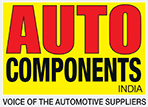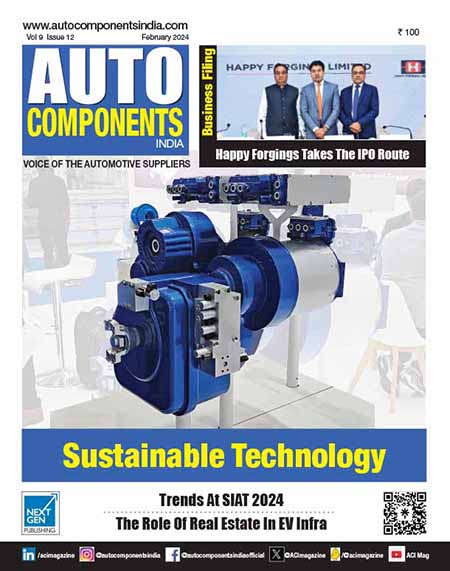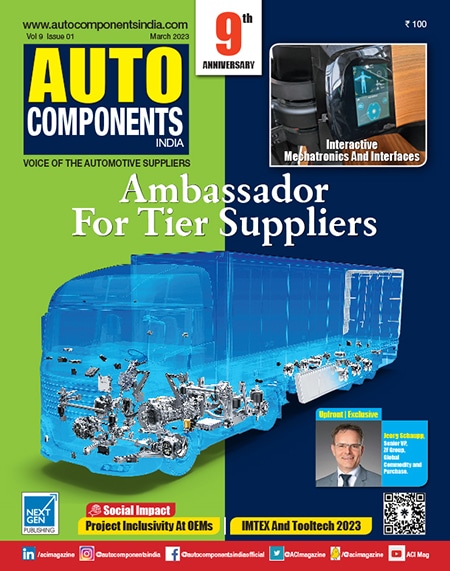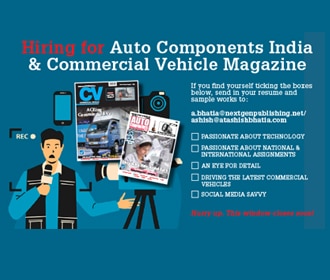Text & Photos: J Srikant
Assocham’s 2nd World Auto Congress proved to be the coming together of all the stakeholder segments in the Indian auto industry, right from vehicle manufacturers and leading component makers to government officials who impact decision making in the sector, and industry experts.
Rightly titled ‘Opportunities across the Value Chain,’ the event voiced the concerns and suggestions of the industry across the spectrum with discussion about optimism on the ‘Make in India’ initiative, to safety and emission concerns.
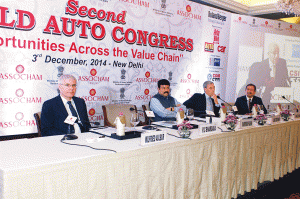 The proceedings were kicked off with the theme presentation by Dr Wilfried Aulbur, Chairman, Assocham National Council on Automotive Industry and Managing Partner, Roland Berger India who spoke about the macro-economic possibilities for India to grow. “Despite the less favorable environment globally, India can easily do 7-8% GDP growth and this will have an impact on the auto sector,” he said. “But it will not happen on auto pilot and we will have to take pro-active steps to move the needle.” He suggested some of the steps that the new government could look at should include labour law reforms, infrastructure upgradation and removal of red tape.
The proceedings were kicked off with the theme presentation by Dr Wilfried Aulbur, Chairman, Assocham National Council on Automotive Industry and Managing Partner, Roland Berger India who spoke about the macro-economic possibilities for India to grow. “Despite the less favorable environment globally, India can easily do 7-8% GDP growth and this will have an impact on the auto sector,” he said. “But it will not happen on auto pilot and we will have to take pro-active steps to move the needle.” He suggested some of the steps that the new government could look at should include labour law reforms, infrastructure upgradation and removal of red tape.
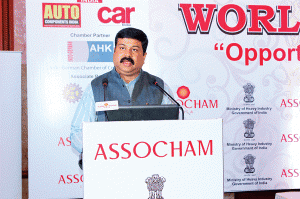 Bolstering the optimistic expectations of the industry, Dharmendra Pradhan, Minister of State (Independent Charge) for Petroleum & Natural Gas, said they are eyeing not single but double digit growth in the economy. He emphasised that the entire auto sector has an important role to play in it as there is no better sector than auto to create employment and economic empowerment.
Bolstering the optimistic expectations of the industry, Dharmendra Pradhan, Minister of State (Independent Charge) for Petroleum & Natural Gas, said they are eyeing not single but double digit growth in the economy. He emphasised that the entire auto sector has an important role to play in it as there is no better sector than auto to create employment and economic empowerment.
Saurabh Mohan Saxena, COO, ZF Hero Chassis Systems, said that the industry welcomed the ‘Make in India’ initiative but there are a lot of issues that need to be addressed before this initiative could realise its full potential. He mentioned that there is a huge difference between regulatory processes between the various states to set up a factory and that there should be common regulations to ease the process. He also called for fast implementation of GST and of bringing down excise duties.
The last few years have not been good for the auto industry with sales in almost all categories languishing below expectations. Things took a turn for the worse when some of the most popular cars failed the crash test, raising serious doubts on the safety of passengers. Expectedly, fingers were pointed at the auto industry for the large number of road accident deaths which take place every year on Indian roads.
However, it was said that it is not fair to put all the blame for road accidents on the auto industry. R C Bhargava, Chairman of Maruti Suzuki India Limited, opined that the reasons are non-compliance of traffic rules. “There is a perception that road accidents happen because not all vehicles are fitted with airbags or ABS, which is far from the truth. Family travelling on a two-wheeler, no regard for traffic signals, lane changing without any indication, are some of the main reasons,” he said. He also touched upon the fact that even for emissions, the auto sector is made the scapegoat for the pollution in cities, while a lot of it is because of the dust particulate and burning of
organic matter.
The event did showcase the auto industry’s concern for the environment with a presentation by Centre for Science and Environment (CSE), which is a not-for-profit research and advocacy organisation. Anumita Roy Chowdhury, Executive Director – Research and Advocacy at CSE was a keynote speaker at one of the two technical sessions of the event. Technical session-1, titled ‘OEM: At the cusp of next wave growth’ gave the perspective of the manufacturers and Technical session-2 was on Policy & Regulatory Challenges and opportunities.
Chowdhury said there is a dire need to improve the technology in vehicles to reduce emissions. She pointed out that while policy changes are happening too slowly, the number of cars is increasing at a maddening pace. She particularly targeted diesel engines saying that it is only at Euro V and Euro VI that the emissions from diesel engines are beginning to be addressed.
One of the most important points discussed at the conference was the implication of free trade agreement (FTA) on the Indian auto industry. Vishwajit Sahay, Jt Secretary, Department of Heavy Industry & Public Enterprises pointed out that FTAs have offset the trade balance and led to more imports than exports in the case of auto components. Giving the example of Thailand, he pointed out that India’s import was $1,040 million compared to exports of $413 million in FY 2012-13. “We are aware of this and are in touch with Ministry of Commerce, and know that a lot of these FTAs are being reviewed. In fact, India-EU FTA negotiations are also in an advanced stage and one of the reasons it is not happening is because of EU’s insistence on inclusion of the auto sector, which we have been steadfastly opposing.”
The reason for this demand from EU also came to the fore when Joao Cravinho, Ambassador and Head of Delegation of the European Union addressed the audience. He informed that exports of cars to EU from India, which stood at over 160,000 cars in 2012, was much more than imports to India from EU which was less than 40,000 cars. He opined that this is largely in favour of India and it cannot be sustained over a long term.
The other main speakers at the event were Tomas Ernberg, Managing Director, Volvo Auto India, Rajiv Bajaj, Partner, Nomura Research Institute India, Dr Ravi Shekhar, Senior Scientist, Transportation Planning Division, Central Road Research Institute and Pavan Sachdeva, Senior General Manager, Mahindra Reva. These speakers primarily spoke on sustainable mobility and its future in India.
